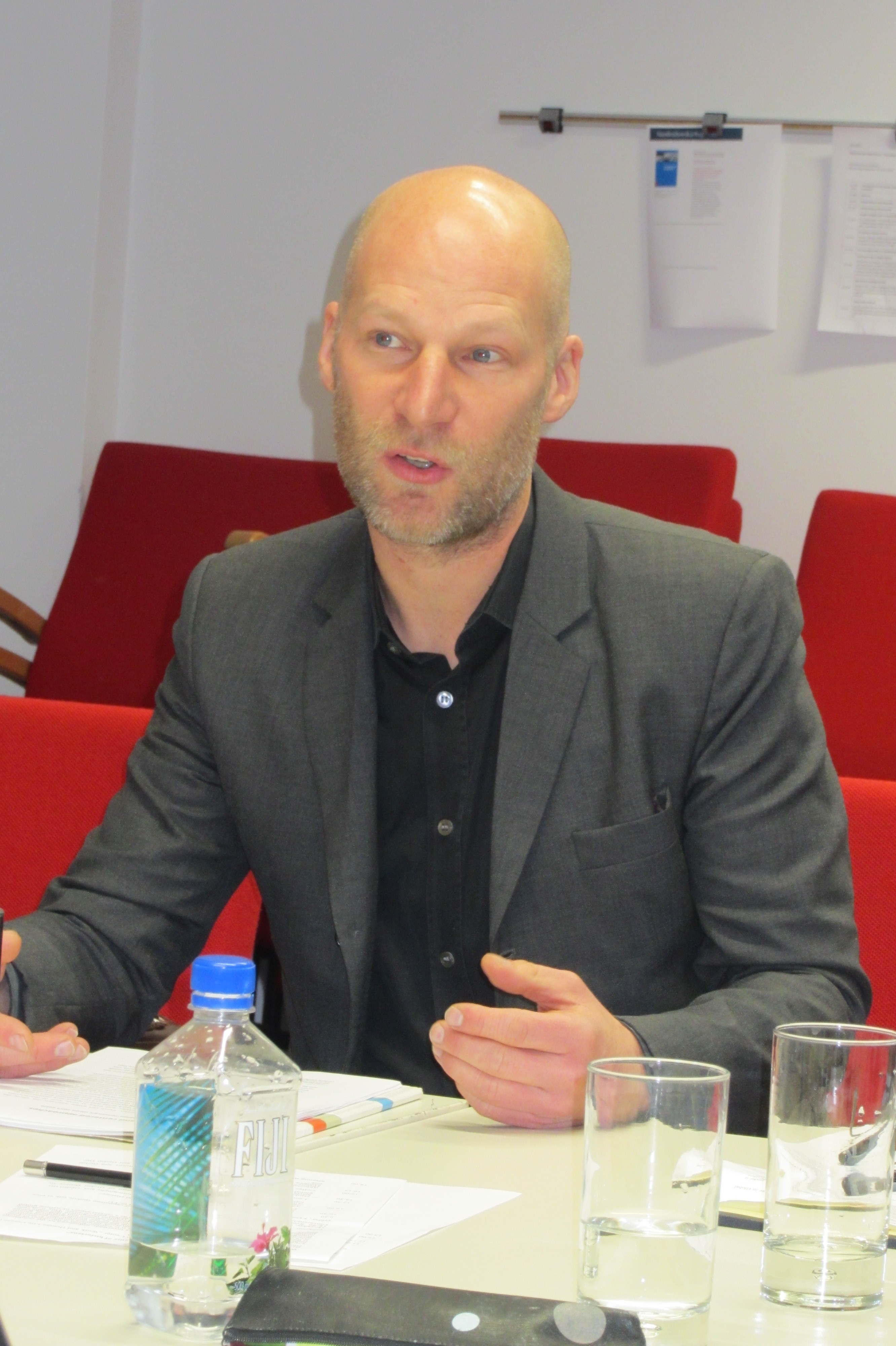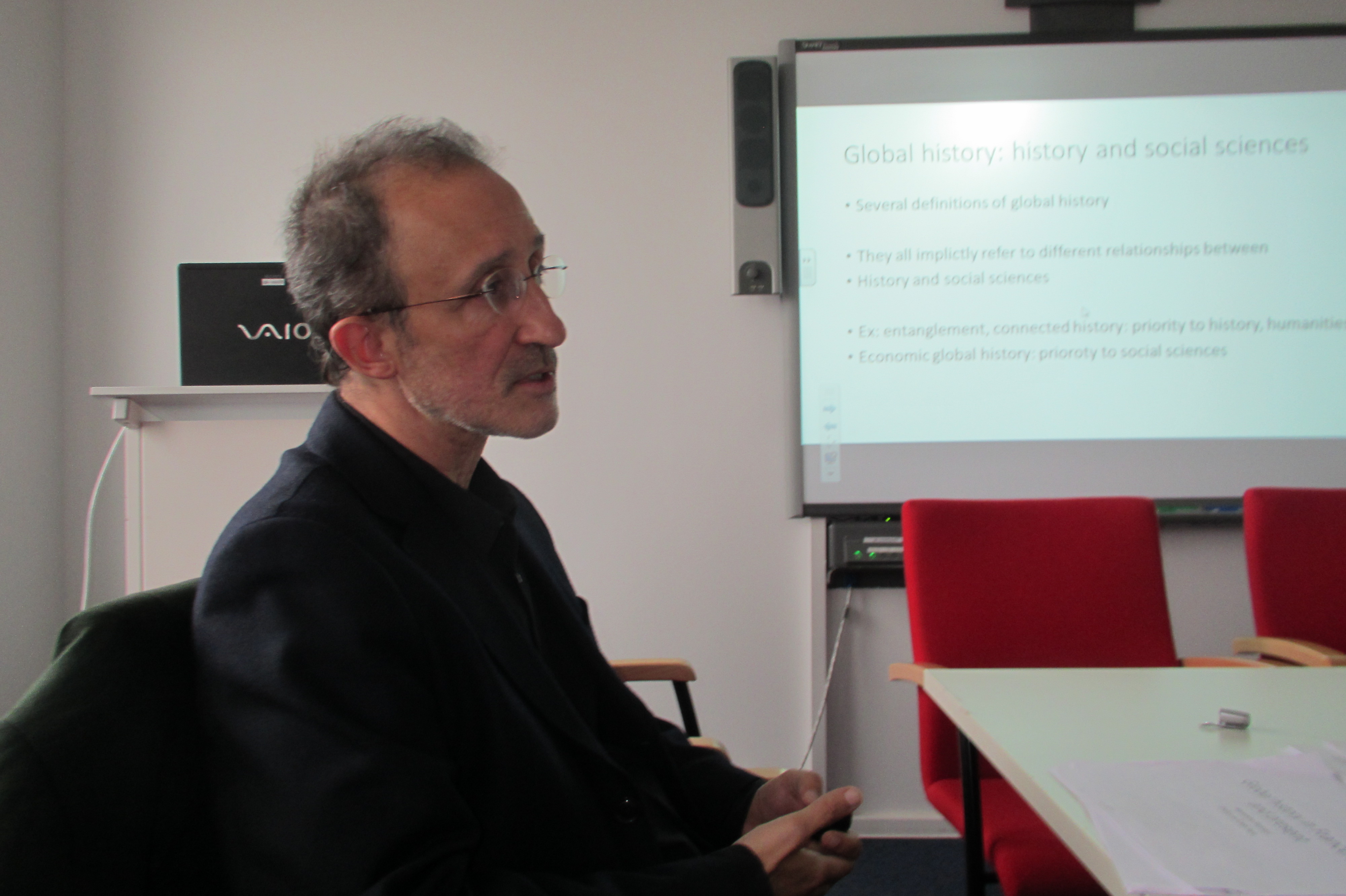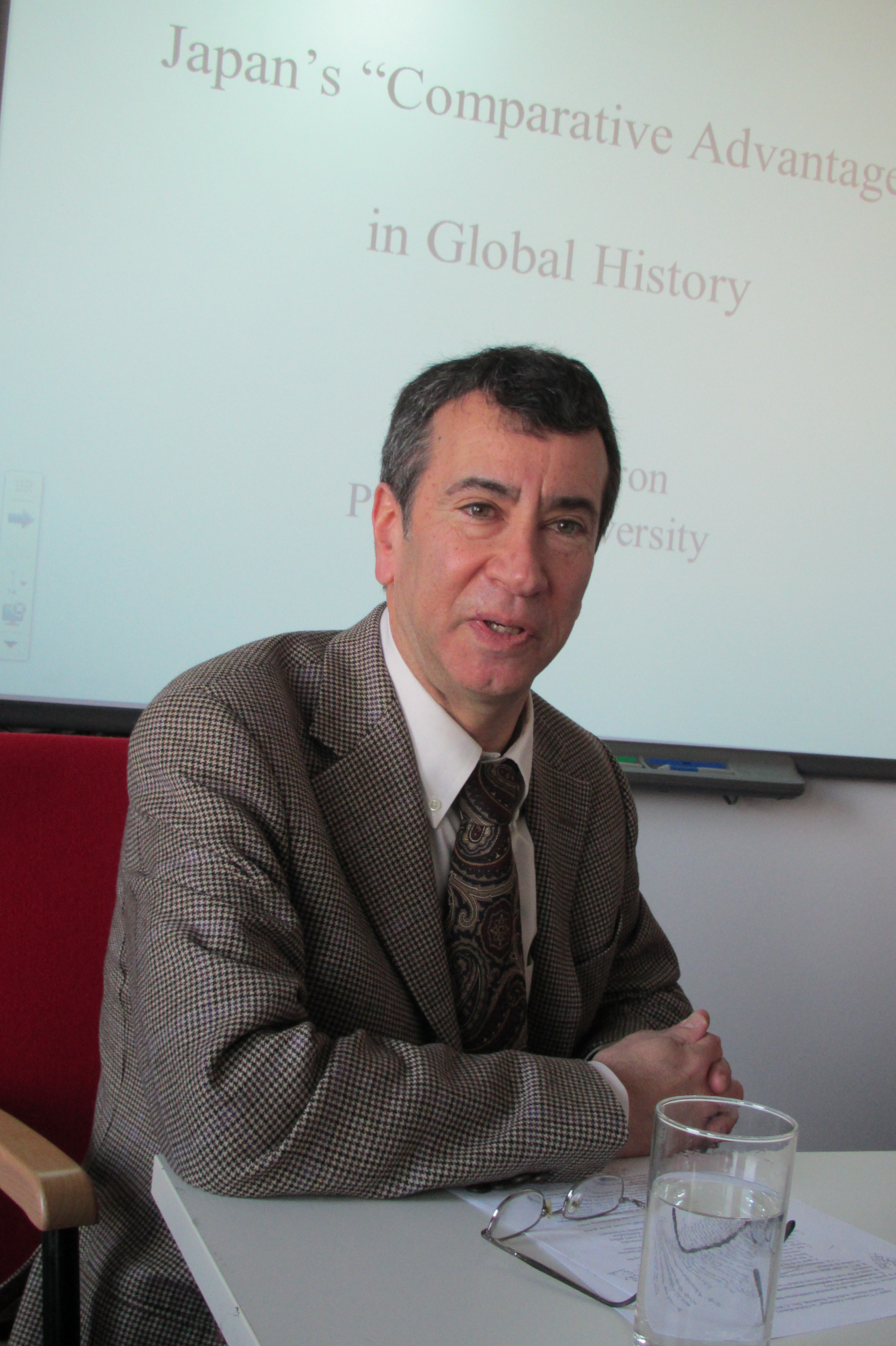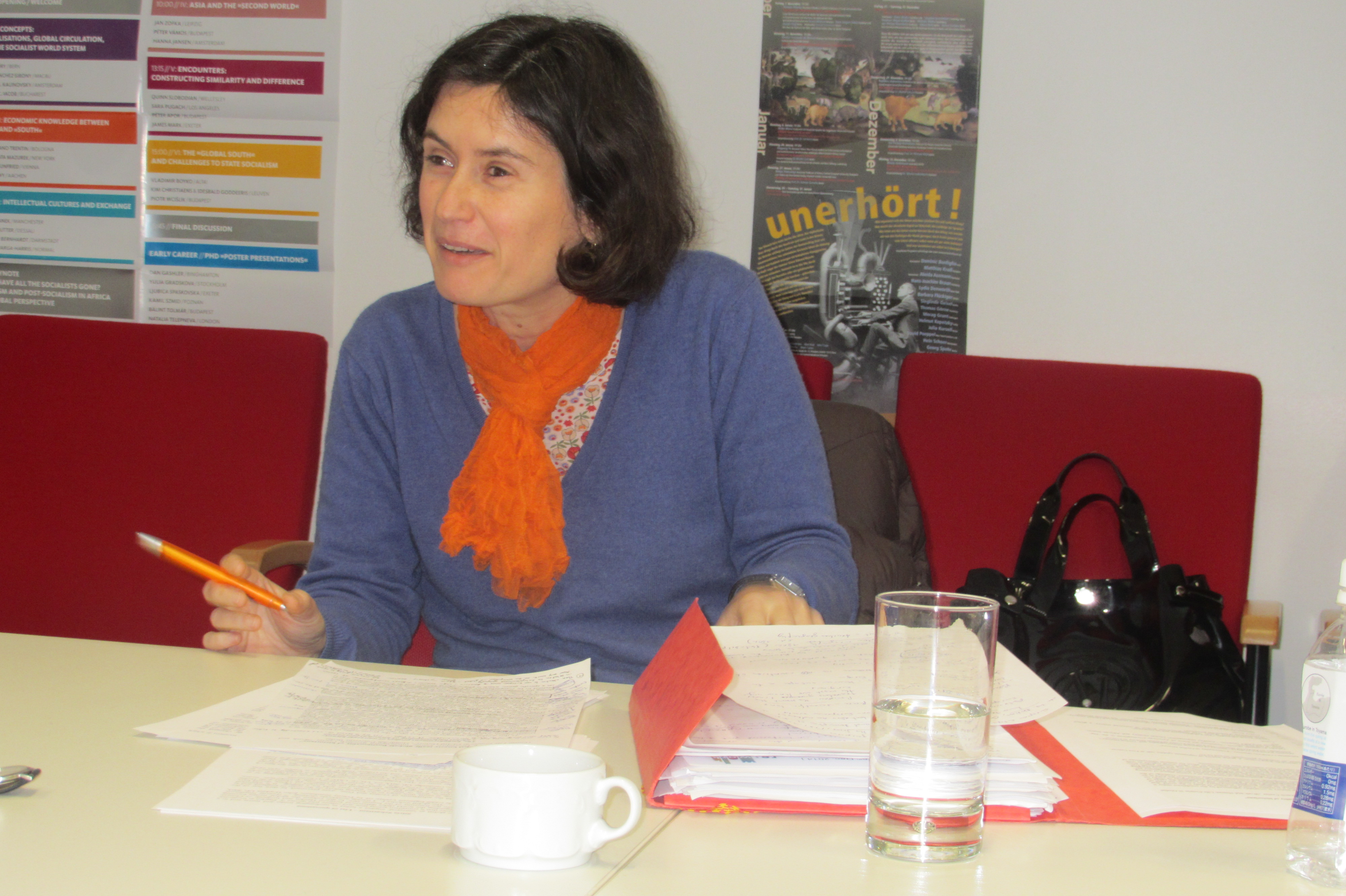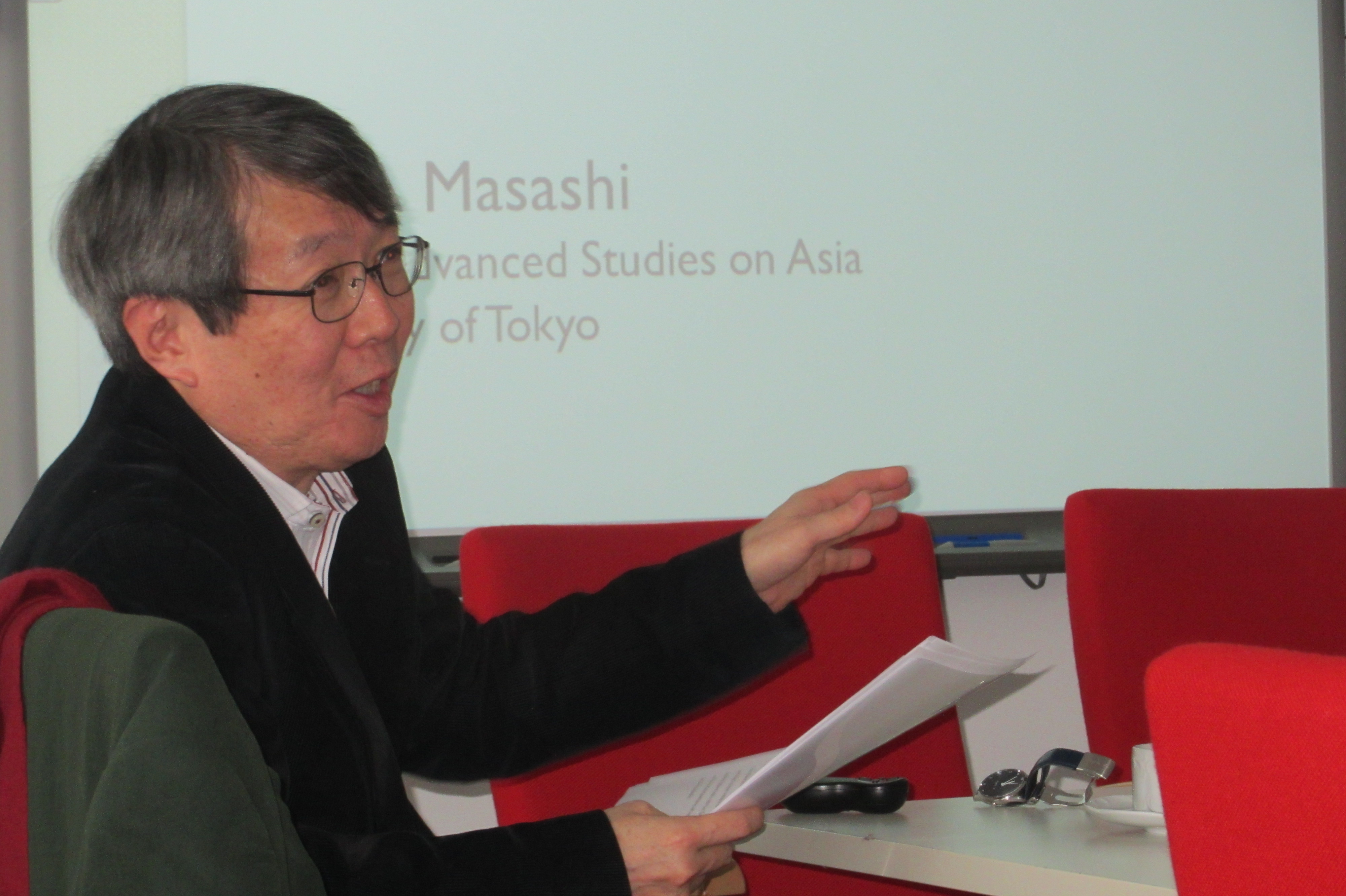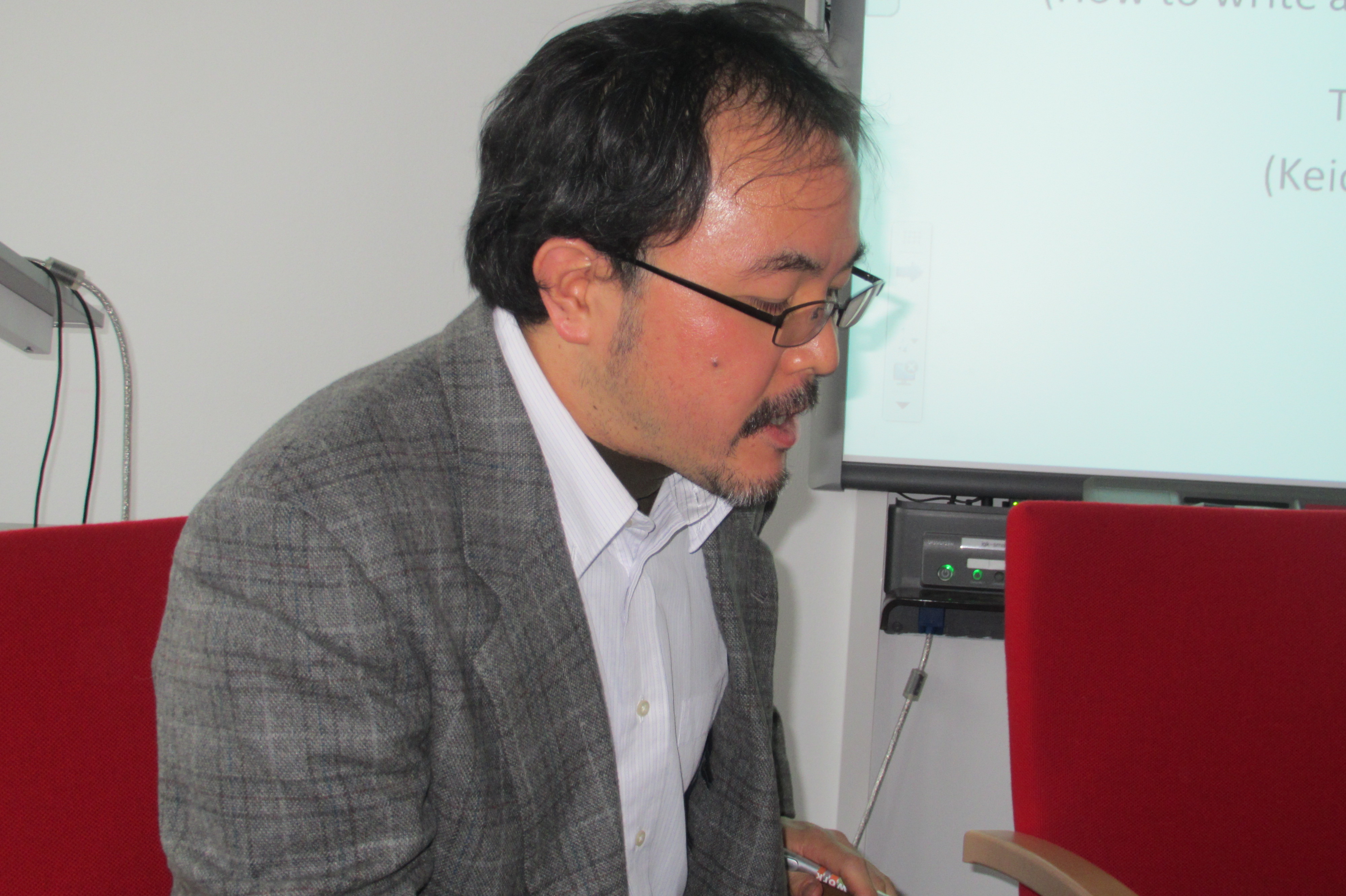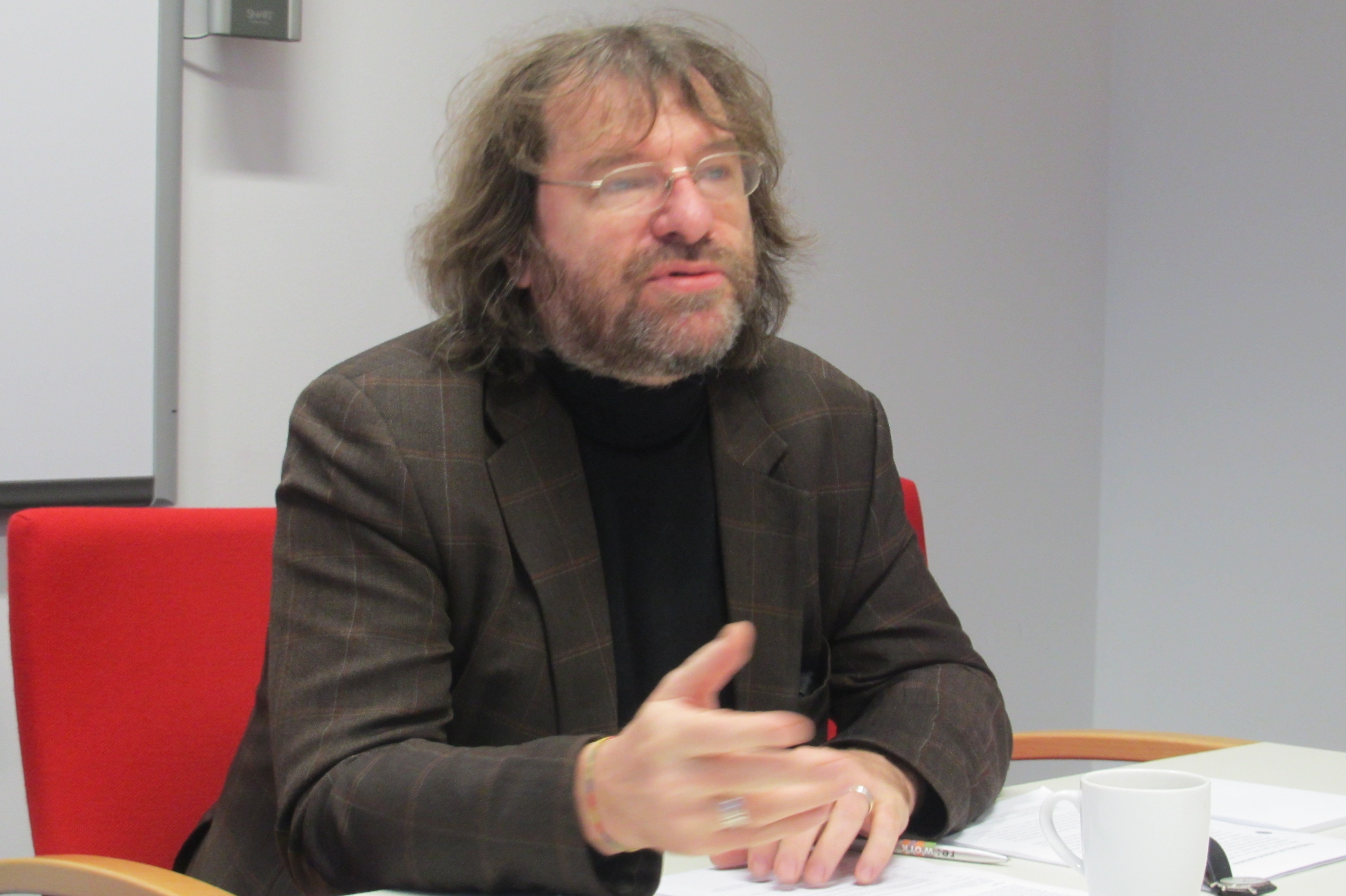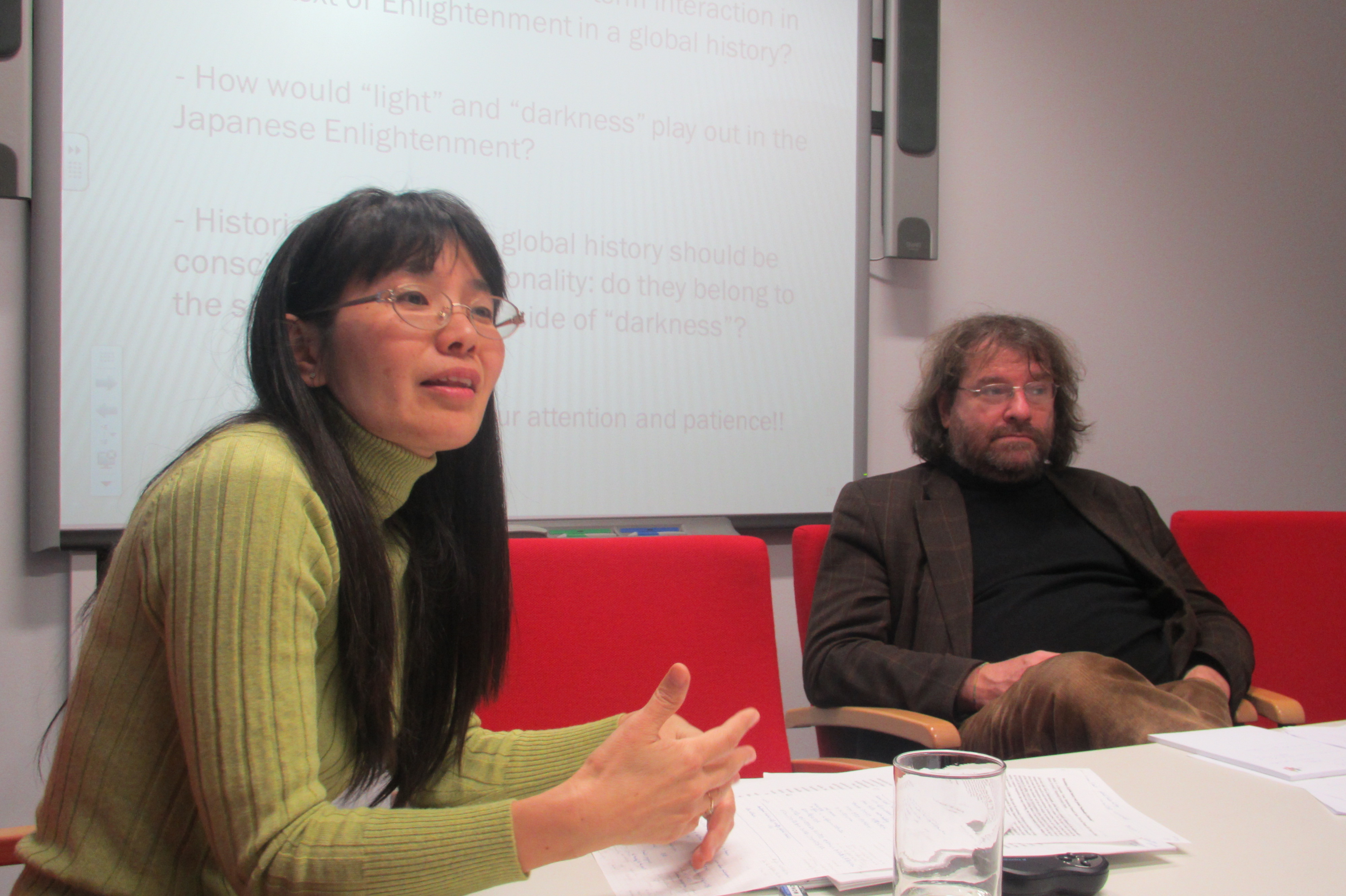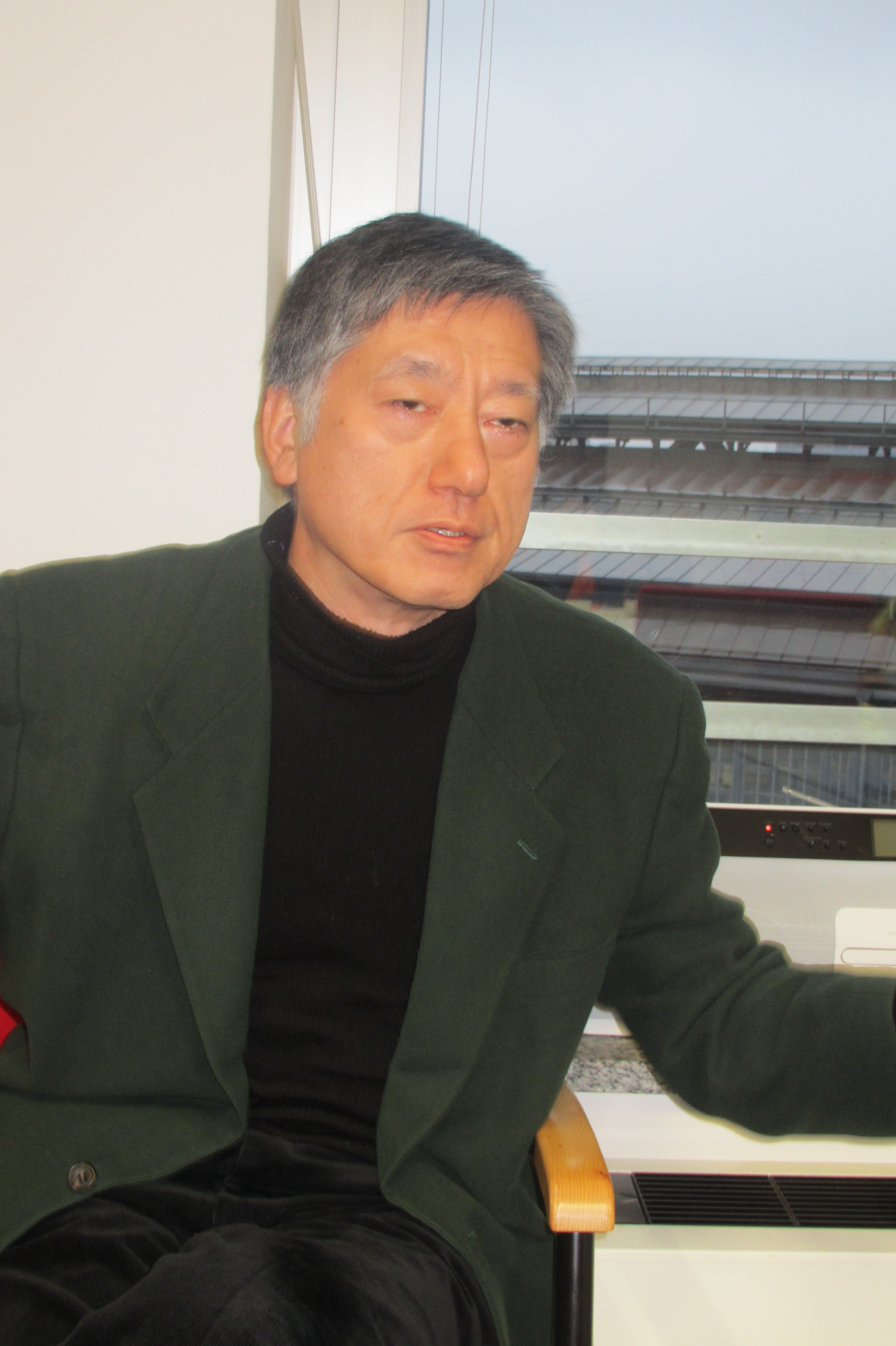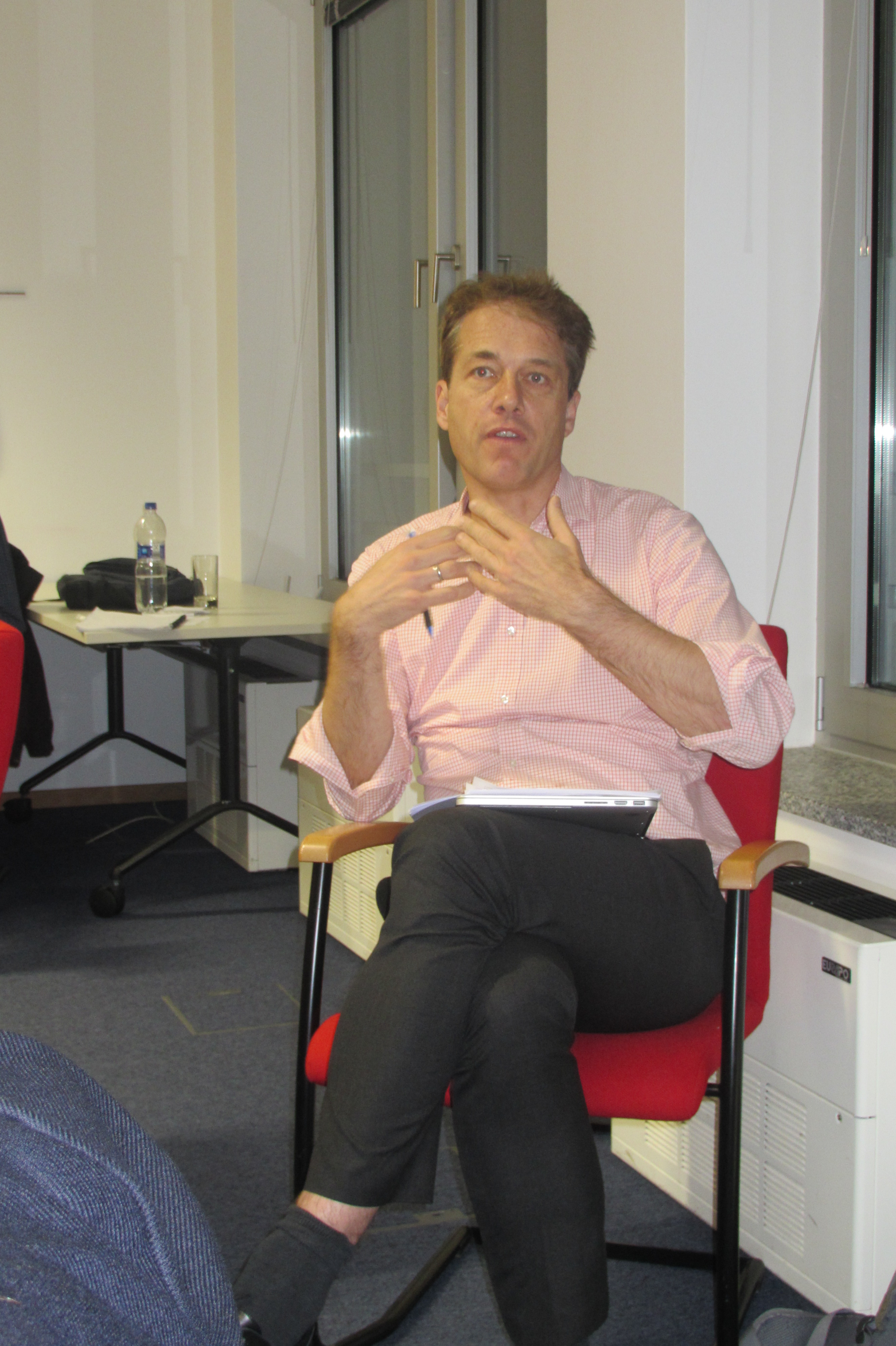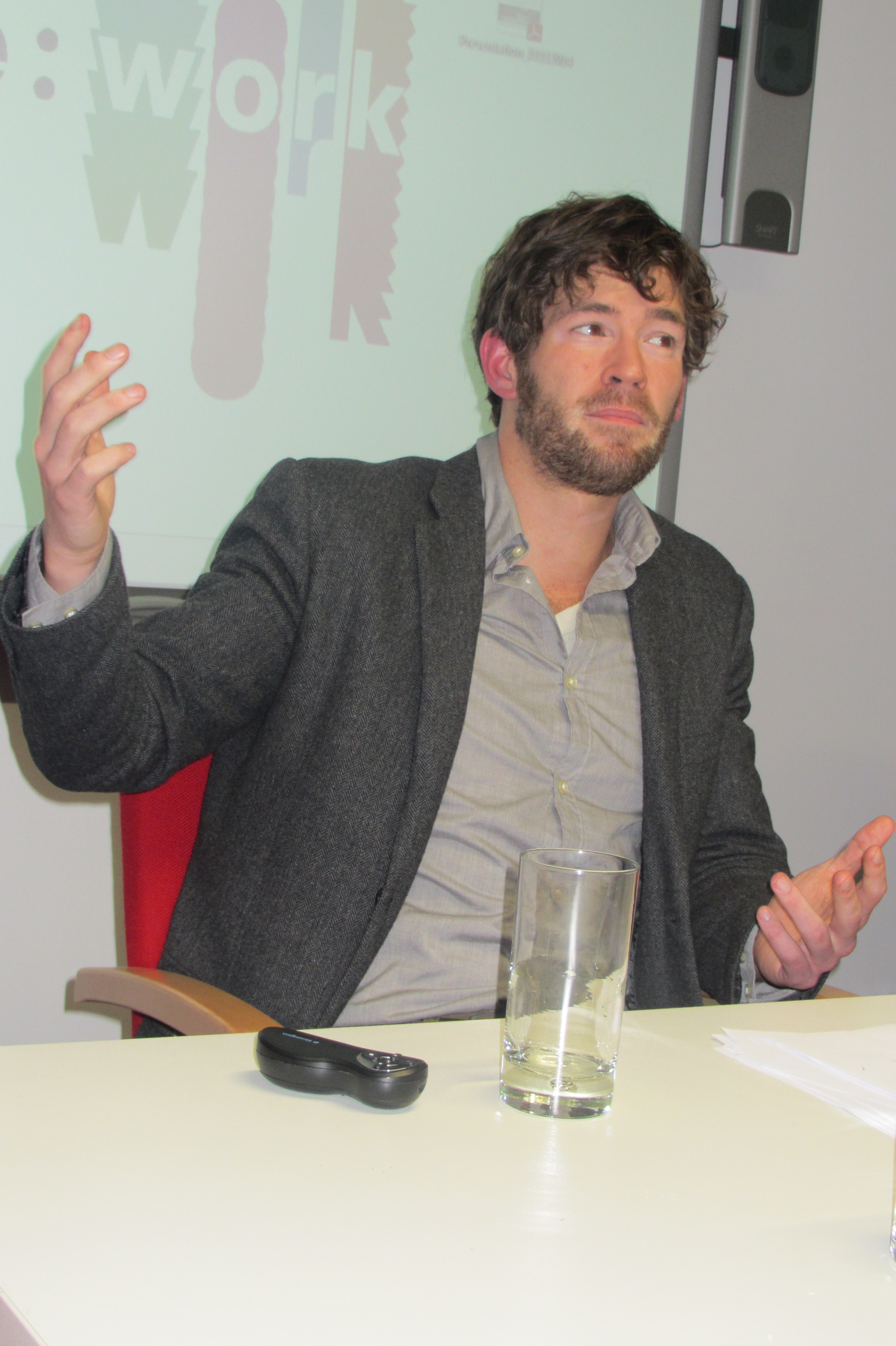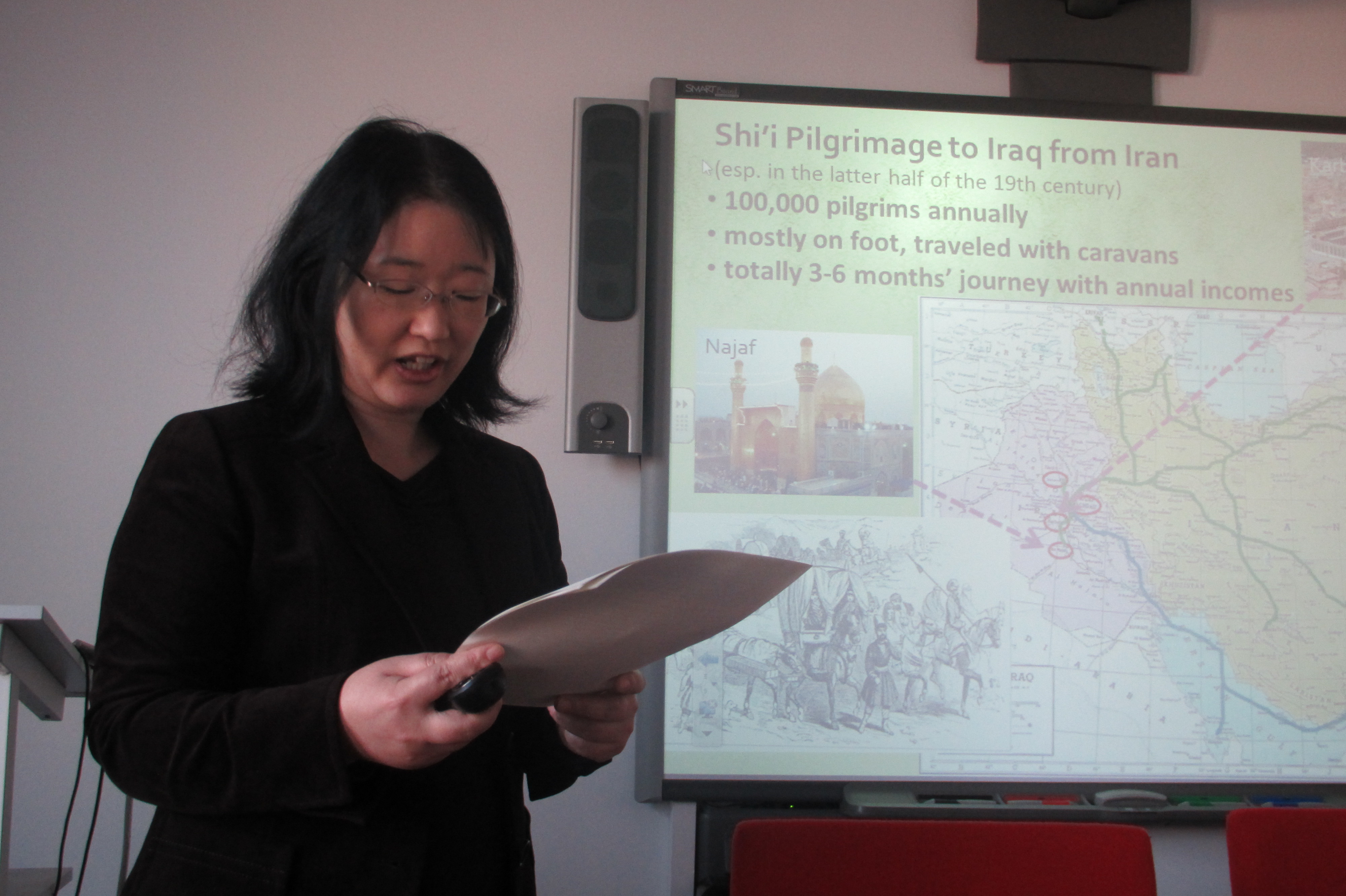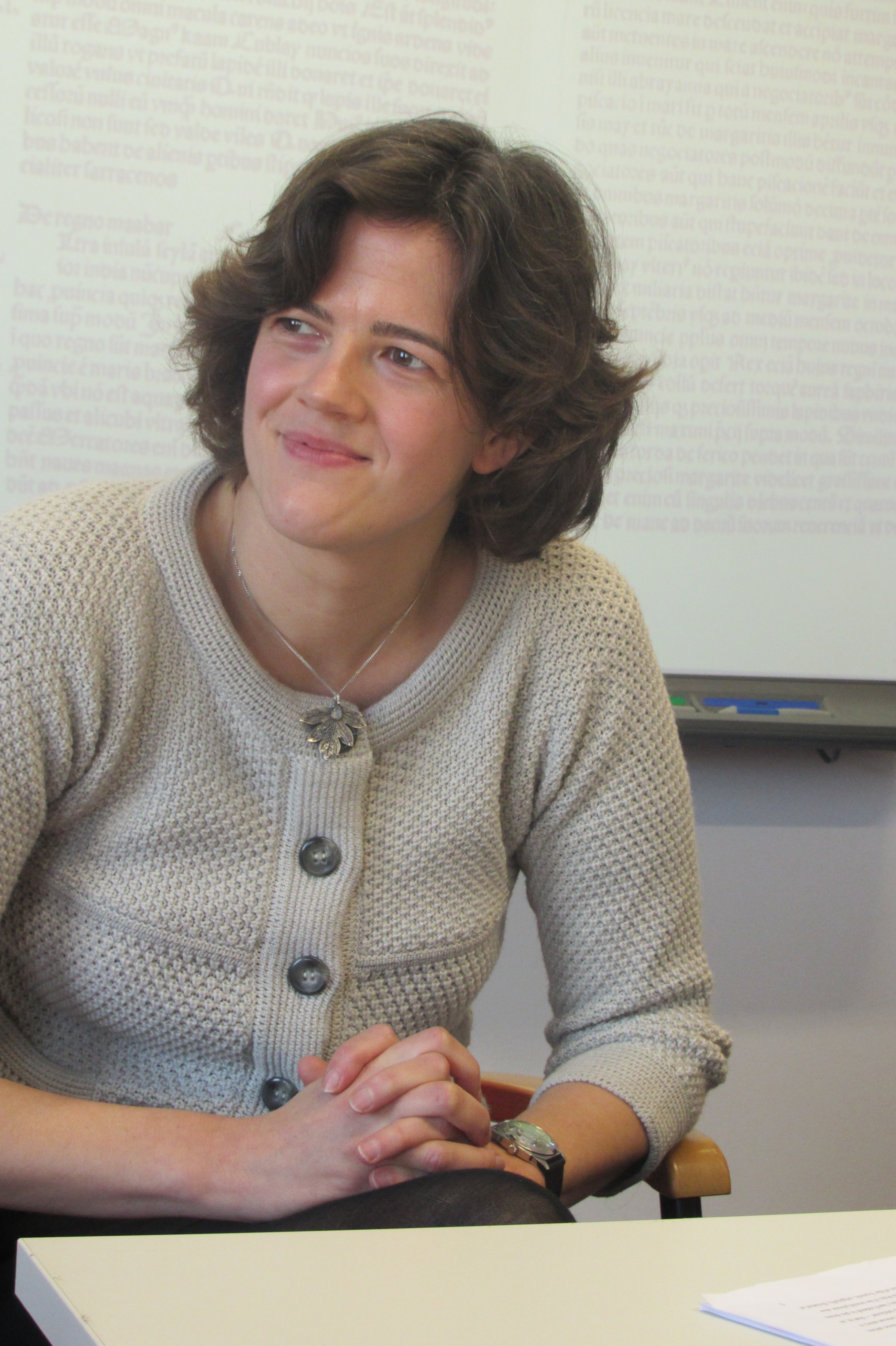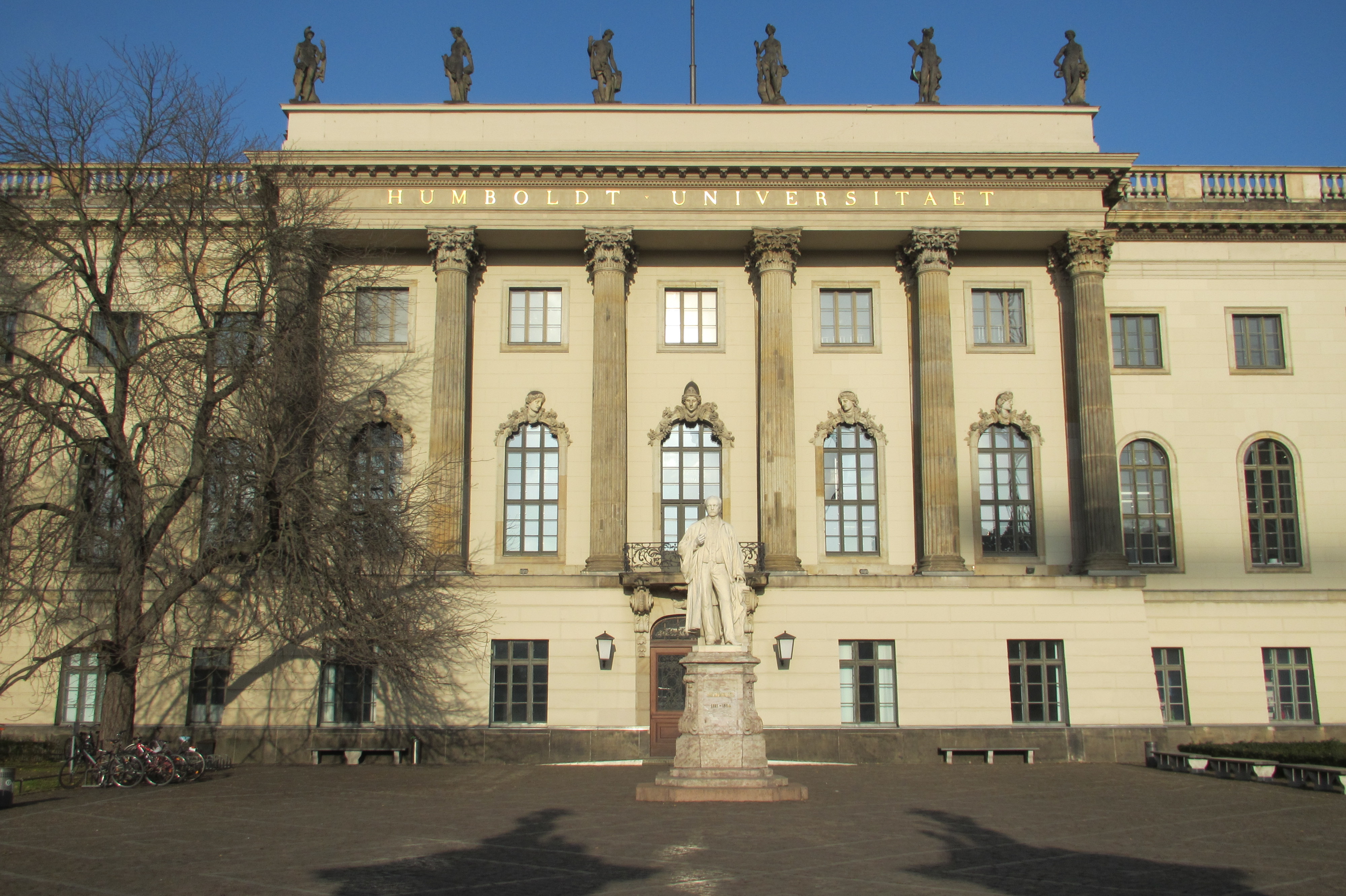2014.12.05
ベルリン大学共同研究 Workshop at Humboldt Universität
2014年12月4日のベルリン自由大学におけるSven Beckert氏の講演に引き続き、5日は同大学サテライト教室にて、東京大学、ベルリン自由大学、パリ高等社会研究院、プリンストン大学からの各研究者による報告と議論が行われた。(敬称略)
Sebastian Conrad(Berlin): ''Positionality in global history”
コンラッド氏は事前提出のペーパーを基に、グローバル・ヒストリーに取り組む各研究者の立場性(positionality)の違いを克服することの困難について論じた。
これに対しフロアから多数反論があり、世界史を描く上での「統合」をどうするのか、経済史的に立場の弱い地域をどう描くのかといった問題や、日本・中国からの反論がヨーロッパ中心主義への反論たりえていない点はどうなのかという疑問、またヨーロッパ中心主義の父親的(paternal)立場の傲慢性について、それぞれ質問があった。さらに世界史を語る言語の問題やグローバル・ヒストリーにおけるアメリカ的性格、ナショナル・ヒストリーとの関係をどう考えていくのかなどについても疑問が呈された。コンラッド氏はむしろ世界史にはそれぞれの立場があり、一つに統合することは不要との見解を示した。
Haneda Masashi(Tokyo):History of Japanese Historiography and “Global History“
羽田氏は日本における世界史教育の歴史、世界におけるグローバル・ヒストリーの潮流について年代順に紹介し、その中で日本の歴史学は日本史・東洋史・西洋史が主な枠組みであること、日本史との壁が大きいと同時に、英語で日本史を説明することで壁を低くする必要性があること、そのための「新しい世界史」構築の問題について論じた。
これに対し、フロアから日本の東洋史とはどのようなものかといった基本的質問があり、ヨーロッパとは異なる漢学の存在についての説明があった。また日本の歴史的伝統の中でグローバル・ヒストリーに関して何が起きているのかと質問があり、羽田氏は日本史研究者にグローバル・ヒストリーについて説得していくことの困難と、各国の歴史学がそれぞれのアイデンティティと密接であるが故の問題点を指摘し、コンラッド氏の「立場性」との共通点が浮き彫りとなった。
Alessandro Stanziani (Paris): “The past and present of Global history in France”
スタンツィオーニ氏はグローバル・ヒストリーへの関心はフランスでも高いが、取り組む歴史家が少なく、似たような比較史が多い現状と、デュルケム以降の社会科学との密接な関係性などを、アナール学派の歴史とともに紹介した。その背景にはヨーロッパ中心主義Eurocentrismがあり、アプローチに多様性がなくアナールの枠組みから出ようとしないため、グローバル・ヒストリーをやるのは「リサイクルされた」人々(いわゆる大家)であると、ユーモアを交えて解説した。そのため今後のグローバル・ヒストリー研究において「文化的地域」を比較分析する方法、資本主義の捉え方など、様々な問題点が残っていることも指摘した。
これに対し、フランスの歴史的伝統におけるグローバル・ヒストリーの問題と、歴史家の立ち位置をどのように決めるべきなのかといった点への質問があり、スタンツィオーニ氏はそれぞれの歴史家が各自の研究分野から出ることはないだろうし、そこに留まるだろうとの悲観的意見を述べた。
Fushimi Takeshi(Keio): “Searching the Place of American Civilizations in the ‘Japanese World History’”
伏見氏は日本の世界史におけるラテン・アメリカ史について解説し、戦後の世界史ブームの中でも、日本ではメソ・アメリカの記述が欠如してきた状況を示した。日本ではアメリカの文明化(Civilization)が「征服された歴史」として認識されているが、伏見氏自身はメソ・アメリカ文明を「第5の文明」とも考えており、この研究に貢献した日本人文化人類学者、泉靖一(1915-70)らについて紹介した。その中でもメソ・アメリカ研究を目指した日本の研究者の多文化主義的傾向が非常に印象的であった。
フロアからはアウトサイダーとしての伏見氏らがメソ・アメリカ史を描く上での立場性について質問があり、伏見氏は「日本で」というよりも、フィールドワークや考古学研究の成果を現地で刊行してメソ・アメリカ研究に貢献しているのが現状であることを説明した。
Andreas Eckert (Berlin) : “Another imperialism? Global History and African historians”
エッカート氏の報告では、タイトルにあるimperialismについての説明はなく、あくまでアフリカ史側からのグローバル・ヒストリーの問題点が指摘された。大きな問題点として、アフリカ人による歴史研究は「アフリカの中の」アフリカ研究になりがちであり、グローバル・ヒストリーとの関係は語られない。ただし、アメリカ黒人のルーツとしてアフリカ研究が行われているが、アメリカ視点の研究になりがちである。またアメリカの大学では人類史へのアフリカの貢献や、政治的立場の問題に関心があり、アフリカ人も大学で開発などの分野を学んでいるが、一方でアフリカ人自身が歴史を描くことができない社会的構造がある、といった深刻な問題が指摘された。
これについてフロアからもアフリカの複雑な言語の問題、現状をどうしたらよいかなど、ランダムな質問が相次いだが、エッカート氏自身もアフリカ人研究者に一緒に歴史を書くことを呼びかけつつ、上手くいっていない現状を答え、結論は出なかった。
Yuge Naoko(Waseda):”The enlightenment and its Darkness”
弓削氏は日本の西洋史家たちがヨーロッパ啓蒙思想を過大評価していることへのアンチ・テーゼとして、負の側面(darkness)を中心に論じた。まずケンペルの『日本史』(志筑忠雄訳『鎖国論』独語原書)を皮切りに、ユダヤ人問題とヨーロッパの市民権を論じたドームなど、啓蒙思想家の中には客観的視点を持った人々が存在する一方、人種の格付けを行った人類学者ブルーメンバッハの思想を紹介し、啓蒙思想家の人種観がヨーロッパの人種的優位性を決定づけた過程について説明した。またこの思想が福澤諭吉ら明治の文化人にも影響している点、帝国主義政策との関連性についても指摘した。
これに対し多数の質問があり、啓蒙思想の負の側面ばかり強調することへの疑問、ヨーロッパの「統一的」思想としての啓蒙思想形成の重要性を無視できないのではないかとの指摘があった。弓削氏は啓蒙思想のそうした側面を肯定しつつ、グローバル・ヒストリーの文脈で見るならば人種(race)の問題は避けられないし、むしろ関係してる点を強調した。
(文責:森永貴子)
Akinobu KURODA (Tokyo), “Monetary Theory, Monetary History and Global History”
黒田氏は、貨幣史において、史実に即した新しい理論が必要であることを提言した。これまで、事実からではなく推測に基づいて、理論をたて貨幣史の基本枠組みがつくられていた。中国、インド、ヨーロッパ、アフリカの広範な地域を検討した結果、そもそもの理論が間違っていたことが証明された。具体的には、近距離圏内、農民同士など同業種間、多次元の貨幣の並列、などが無視されていた。これら史実に基づき、交換手段を分類しなおし、同時併用を原則として、人類全体の新しい理論を打ち立てられることが示された。
この意義は貨幣史の範疇にとどまらない。たとえば貨幣の信用を誰が与えていたかについて、従来では権力(国家など)や遠方交易など上の次元での交易を想定していた。しかし、新しい枠組みのもとでは、貨幣の使用者自身が与えていた側面が強調される。これは下とみられていた人々のエージェンシーを広げるもので、「下からの(使用者の)視点」が、歴史と理論全体の見方に影響を与えることが展望となってあらわれた。
Matthew KARP (Princeton). “American Slavery, Slaveholders, and Global History”
プリンストン大学のカープ氏の発表は、アメリカ南北戦争のもつ世界史的な意義を再解釈するものであった。このワークショップの前晩のスヴェン・ベッカート氏の講演では、南北戦争は世界の綿花供給に大打撃を与え、世界が当時すでに緊密に影響しあいながら綿織物生産を行い、南部の奴隷による綿花生産がその核となり続けたことが確認された。これに対しマット氏は、南部の奴隷主たちをどう位置付けるべきなのか、と問題提起した。南部が奴隷使用によって生み出した富は「近世の残滓」とみなされ、南部の敗北によって「近代化」が促されたとされる。
しかし、逆に19世紀の「近代」にこそ人種不平等が強まり、「褐色の人種dark races」を不平等労働へ駆り立てる措置がつくられた。その点から、南部は「帝国主義のグローバルなラボラトリー(実験場所)」とも捉えられ、国家の牽引する自由労働による工業化に替わり、とりわけ「褐色の人種dark races」を差別して強制労働で原料を栽培させることに基づいたグローバルな工業化の時代の転換点にたち、南部奴隷主たちは、時代遅れどころか、「ダークサイド」のパイオニアであると論じられた。
これに対するフロアからの議論も興味深かった。賃金労働が強制労働に取って代わるとリニアに想定されるべきでないことが確認される一方、グローバルヒストリーの方法論について、ローカルな発展と国際的な発展の接続をどう行うべきか、また、ベッカート氏やカープ氏の見方が、ある型がどこかで決まり、それが浸透・拡散(diffuse)するため、新たな中心をつくるものであるとの危惧が示された。
Tomoko MORIKAWA (Hokkaido), “Global History and a View from West Asia”
守川氏は、まず多様な地図を使って自身の専門である西アジアの範囲設定がさまざまになされ、ヨーロッパ中心的に、中東(Middle East Near East)と括られ、植民地主義の所産である国境によって区切られていることを示した。地域研究の学術分野が国境を反映していることが妨げとなっていると指摘した。
そして、国境で区分されてしまう問題を打破する一つの方法として、「巡礼地」を視点にみることを提案した。巡礼のハイライトは19世紀にあり、単年巡礼者数だけで聖地ごと10万人を数えるほど大規模な移動である。巡礼研究は、史料上、地域研究の範疇を超えた検討が必要となる。また、世界的にみて巡礼地は限定されており、いくつかの条件が整ったときにしか成立しない。形状の違いに触れながらもそれらを敷衍すれば、巡礼地の世界史を編み出すことが可能でかつ有意義であることが示された。
最後に、今後の歴史研究が、すくなくとも三角形、できれば多角形的視点を持つことが提案され、その意味で歴史研究の枠組みを作る研究の進んでいるヨーロッパや東アジアに対して、西アジアを第三の地として歴史の視点に積極的に加えるべきと述べられた。
Teresa SHAWCROSS (Princeton), “Globalism and the Crisis of Mediterranean Empires: A Medieval Historian’s Approach
ヴィザンチンを中心とする地中海世界の中世史家であるプリンストン大学のショークロス氏は、話題の世界同時配信のドラマ「Worlds will collide」の主人公マルコ・ポーロの取り上げ方を伏線におきながら、13世紀のユーラシア世界の複数世界の関係性をどう考察するべきか、多面的に論じた。
自分が複数世界の小さな存在にすぎないという認識が前5世紀には確立していた一方で、複数の帝国の興隆、さらにそれを圧倒するモンゴル帝国の出現によって、いかにヴェニスやヴィザンチンの自らの位置づけが変わったかが論じられた。13世紀のユーラシア世界について、中心性と多極性、帝国とグローバリゼーションによる地域の取り込みの違い、地域権力間の興亡と交替と連結、不況の共有など、多彩な関係性を浮き彫りになった。
質疑では、遊牧民族による帝国の継続性のほか、複数から、こうしたユーラシア世界認識から韓国・日本が除外されていることが指摘され、帝国に取り込まれたかどうかだけが世界認識に有効な視点かが議論された。
Sheldon GARON (Princeton), „Japan’s ‘Comparative Advantage’ in Global History”
最後の発表者としてプリンストン大学のガロン氏は、歴史研究では排除されていた地域が多々あり、そのもっとも顕著な例として、日本の経験を基点にグローバルヒストリーを考え直すことを提案した。世界史の方法論は、これまで比較・交流・接合・意義をそれぞれ軸としてきたが、新しい軸として「ユーティリティー(使いやすさ)」を視点に、Transnational Learning (諸国を超えたフレームワークで培われた世界の知)に着目し、具体的にはまさに日本が他国での議論や実践を相互参照したうえで、貯蓄政策、戦時国内宣伝や疎開を実践したことの意義が論じられた。
質疑では、ガーシェンクロンの後発国優位説との関連、日本の例外性、近代化と西洋化との関係性など、多数の質問が発せられ、ガロン氏はまとめながら、日本の事例を例外的な成功例ではなく、諸国共通の経験としてみることができることを強調した。
Final Discussion and Future Perspectives
まとめとして、エッカート氏が、これまでの活発な議論のなかで出てきた課題を7つの要点にまとめ、さらに参加者が所感を述べた。エッカート氏が提示した、このワークショップで明らかにされた課題の要点とは、筆者の解釈では以下のとおりである。
- 早い時期(近世・中世・古代など)を意識的に取り込み、世界史としての時系列Chronologyの取り方を、時系列で論じないことも含め広く議論すること
- 世界史のトピックは、物財面、知識面、制度面での交接Discourseが中心となるが、
何を焦点とするかは非常に重要であること
- 史料に対するこれまでの方法論を見直し、批判的に検討することがクリティカルであること
- これまでの分類やコンセプトを、用語レベルから批判し検討する必要があること
- 世界史叙述で英語が言説の中心となっていることに対して、非英語による研究を位置づけ、取り込む必要性と、その方法の検討。
- 世界史研究は(複数地域が)結合し、複雑な関係で、絡み合っていることをいうだけでは、もはや不十分であり、世界史としての意義ある疑問を提示、それにこたえる必要がある。つまり、どのような事柄には世界史的視点が有効かを論じる必要があること
- 世界史研究は、どのように制度化されるべきかを検討する必要性。世界史研究は例外的に偉大な歴史家こそ書かるという風になるか、もともとの専門領域から抜けて「孤独なアウトロー」として書くというパターンになりがちである。これに対して、世界史という分野を集合的に切り拓くにはどのような制度化が有効かを議論する必要性。
全体として、活発な議論がなされ、グローバルヒストリーの抱えるアクチュアルな課題を実感できた、大変有意義なワークショップであった。
(文責:杉浦未樹)
A seminar was presented by Sven Beckert at the Freie Universität Berlin on Dec 4, 2014. On the following day (Dec. 5), a workshop was held in a satellite classroom at the same university in which researchers from the University of Tokyo, the Freie Universität Berlin, the Paris École des hautes études en sciences sociales (EHESS) and Princeton University presented reports and various issues were discussed. (Titles omitted)
Sebastian CONRAD (Berlin): “Positionality in Global History”
Sebastian Conrad discussed the difficulties in overcoming the differences in positionality of researchers engaged in global history based on a paper that was made available to the audience in advance.
In response, a large number of objections were raised by the audience. Questions include: what should be done regarding uniformity of descriptions of world history (or histories of the world), how vulnerable regions in terms of economic history should be described, why objections from Japan and China do not sufficiently refute eurocentrism, and the arrogance of the paternal stance of eurocentrism. Questions were also posed regarding issues related to the languages used to describe world history (or histories of the world), the American character of global history, and how to think about global history in relation to national histories. Conrad expressed the view that various viewpoints should exist in world history and that such uniformity is unnecessary.
HANEDA Masashi (Tokyo): “History of Japanese Historiography and “Global History”
Masashi Haneda traced the evolution of world history education in Japan and the current of global history in international society over time. In his description, Haneda noted that the main frameworks for historical studies in Japan are Japanese history, Oriental history, and Western history. He further explained that there is a need to lower the barrier of Japanese history by describing Japanese history in English and the challenges in creating a “new world history” in order to do so.
In response, a basic question was raised from the audience regarding the nature of Oriental history in Japan, which yielded an explanation of the existence of kanji (Chinese characters), which is unique to the region (i.e. that does not exist in Europe). There was also a question regarding developments in the Japanese historical tradition related to global history. Haneda responded by describing the difficulties in convincing Japanese historians of the importance of global history and pointed out the fundamental issue stemming from the close relationship between each country’s historical study and national identity. In doing so, Haneda brought to the fore various points in common with Conrad’s “positionality.”
Alessandro STANZIANI (Paris): “The past and present of Global history in France”
Alessandro Stanziani reported that, although there is substantial interest in global history in France, few historians actually engage in it, adding that a large number of historians engage in very similar comparative history. In addition, Stanziani described the close relationship between global history and social sciences since Durkheim and introduced the history of the Annales School. While mixing in humorous comments, he explained that there is an underlying eurocentrism and that, because of the lack of diversity in approach and the unwillingness to step outside the framework of the Annales School, global history is engaged in by only a handful of “recycled” historians. He pointed out that, as a result, various problems remain in global history research related to methods for comparing “cultural regions” and the understanding of capitalism, etc.
In response, a question was raised about how the issues of global history and the positionality of historians should be determined in the French historical tradition of study. Stanziani put forth the pessimistic opinion that individual historians are likely to remain in and not step out of their current research areas.
FUSHIMI Takeshi (Keio): “Searching the Place of American Civilizations in the ‘Japanese World History’”
Takeshi Fushimi explained the state of Latin American history in Japanese world history and showed that, despite the boom in the study of world history following WWII, descriptions of Mesoamerica in history education in Japan have been lacking. While the civilization of the America is generally understood in Japan to be a history of subjugation, Fushimi expressed his personal belief that Mesoamerican civilization represents a “fifth civilization” and introduced the Japanese cultural anthropologist Seiichi Izumi (1915-70) and colleagues who contributed to research in this area. The multiculturalist tendencies of such Japanese researchers who conducted research on Mesoamerica left a particularly deep impression.
A question was raised from the audience regarding the positionality of Fushimi and colleagues when they, as outsiders, describe Mesoamerica. To this, Fushimi explained that he was contributing to research on Mesoamerica by conducting fieldwork and archaeological research and publishing research results in the region in question rather than in Japan.
Andreas ECKERT (Berlin): “Another imperialism? Global History and African historians”
In his report, Andreas Eckert did not explain imperialism, as indicated by the title, but, rather, pointed out issues with global history from the standpoint of African history. One of the issues Eckert identified was the fact that historical research by African researchers tends to be limited to “African itself” and its relationship to global history is rarely discussed. That said, he noted that, while research on Africa is carried out in the context of Africa being the origin of African Americans, such research tends to be conducted from an American point of view. In addition, he pointed out the serious challenge that, although there is interest at American universities regarding the contribution of Africa to human evolutionary history and issues related to political stance and while Africans also study development at American universities, there exists a social structure in which Africans themselves are unable to describe their own history.
The presentation yielded a series of random questions from the audience regarding issues related to the large number of and complexities of languages used in Africa and how current circumstances can be overcome. Eckhart responded by describing his unsuccessful attempt to write history with African researchers, and no conclusion was reached.
YUGE Naoko (Waseda): “The enlightenment and its Darkness”
Naoko Yuge focused on the negative aspects (darkness) of the enlightenment as an antithesis to the over-valuation of the philosophy of European enlightenment by Japanese historians of the Western World. Starting with Kaempfer’s History of Japan (Tadao Shichiku’s translation Sakoku Ron [Isolationist Theory] of the German original), Yuge discussed the existence, on the one hand, of enlightenment scholars, such as Dome (who discussed the issue of Jews and European civil rights), who adopted an objective viewpoint and of scholars such as the anthropologist Blumenbach who rated the various races. She further explained the process by which the racial views of enlightenment scholars validated the racial superiority of Europeans. In addition, Yuge also pointed out the influence that such ideology had on cultured persons of Meiji-Era Japan such as Yukichi Fukuzawa and the relationship of such ideology to Japan’s imperialist policies.
In response, numerous questions were raised by the audience, including doubts regarding the soundness of emphasizing only the negative aspects of enlightenment philosophy. In addition, there were comments pointing out that the importance of the creation of the philosophy of enlightenment as Europe’s unifying ideology could not be ignored. While affirming these aspects of the philosophy of enlightenment, Yuge emphasized the point that the issue of race, in the context of global history, cannot be avoided and is, in fact, integrally related to global history.
(Summarized by Takako MORINAGA)
KURODA Akinobu (Tokyo): “Monetary Theory, Monetary History and Global History”
Akinobu Kuroda argued the need for new theory of monetary history based on historical facts. Up to this point, the framework for monetary history was constructed according to theory that was based on supposition and not empirical facts. As a result of conducting investigations over a wide geographic area including China, India, Europe, and Africa, it has been demonstrated that the underlying theory itself is incorrect. Specifically, the preceding theory has ignored local economies, as well as multidimensional monetary arrangements among farm villagers or individuals engaged in the same trade. It is necessary to re-categorize the means of exchange based on these historical facts and to create a new theory for humanity as a whole.
The significance of doing so is not limited to the discipline of monetary history. For example, with regard to the question of who provided the credit for a given currency, it was assumed that the answer was the authorities (national government, etc.) or higher-order (long-distance) trade. That said, the new framework emphasizes the fact that it was provided, in part, by the users themselves. This expands the agency of individuals who were previously seen as being of lower status. It suggests that the “view from below (users)” will influence our view of history and theory as a whole.
Matthew KARP (Princeton): “American Slavery, Slaveholders, and Global History”
Matthew Karp’s (Princeton University) report entailed a reinterpretation of the significance of the American Civil War in the context of the world history. In Sven Beckert’s presentation held on the evening before the workshop, it was confirmed that the Civil War dealt a serious blow to the supply of cotton, the production of which, at the time, already involved close interactions between countries around the world and that cotton production in the US South by slaves continued to serve as a core of this production. Karp asked how the Southern slave owners should be viewed in this context. The wealth generated through the use of slaves is understood to be a vestige of the early modern period, and the defeat of the South, as having ushered in modernization.
In contrast, however, it is in the “modern era” of the 19th century that racial inequality intensified and that the schemes for relegating “dark races” to unequal work were created. Karp argued that, in this sense, the South can be viewed as a “global laboratory for imperialism” and that the Southern slave owners, on the brink of the turning point of an age of global industrialization based on the forcible cultivation of raw materials through the exploitation of the dark races that stood in stark contrast to the industrialization through free labor envisioned by the national government, were not behind the times but, rather, pioneers of the “dark side.”
The response from the audience was also interesting. While it was affirmed, on the one hand, that the supplantation of forced labor by wage-based labor should not be assumed to be a linear, with respect to the methodology of global history, questions were raised as to how local development should be linked to international development and the apprehension was expressed that one form of Beckert’ and Karp’s viewpoints would be decided upon and would permeate and diffuse, creating a new center.
Tomoko MORIKAWA (Hokkaido): “Global History and a View from West Asia”
Using a wide range of maps, Tomoko Morikawa first demonstrated that the boundaries of West Asia, which is her area of expertise, are variously defined and that the Middle East and Near East is eurocentrically demarcated and divided based on national boundaries that are the product of colonialism. She pointed out that the scholarly divisions within areas studies which reflect national boundaries are obstacles.
Morikawa further proposed using the guiding concept of pilgrimage destination as one method for overcoming the problem of segmentation based on national boundaries. Pilgrimages reached a highpoint in the 19th century, with large scale migrations occurring on the order of 100,000 pilgrims per year per pilgrimage destination. Pilgrimage research, in terms of historical records, requires investigation that crosses over the categories of area studies. In addition, from a global standpoint, pilgrimage destinations are limited in number and only become established when certain conditions are met. Morikawa demonstrated that by identifying and amplifying the differences in form, it would not only be possible but also valuable to devise a world history of pilgrimage destinations.
Finally, Morikawa proposed adopting a triangular or, if possible, polygonal viewpoint in future historical studies and explained that, in this sense, the West Asian view of history should be proactively added as a third region alongside Europe and East Asia in creating a framework for historical studies.
Teresa SHAWCROSS (Princeton): “Globalism and the Crisis of Mediterranean Empires: A Medieval Historian’s Approach”
Teresa Shawcross, who is a historian of the Byzantine Empire Mediterranean World in the Middle Ages at Princeton University, discussed from various viewpoints how the relationship between multiple worlds in the Eurasian World of the 13th century should be examined, while also referring to the manner in which Marco Polo, the protagonist of the much-talked-about drama Worlds Will Collide, which is being broadcast simultaneously around the world, is portrayed.
Shawcross noted that the perception that one’s own world was only a small part of the milieu of multiple worlds had already been established before the 5th century but also explained how Venice and Byzantine’s understanding of their own place in the world changed substantially as a result of the rise of various empires and the appearance of the Mongolian Empire, which overwhelmed all of these. The central and multipolar nature, differences in regional responses based on empire and globalization, the rise and fall, shift, and coupling of regional powers, depression, and other diverse relationships within the Eurasian World of the 13th century were brought to light.
In addition to questions about the continuity of nomadic empires, several members of the audience pointed out the fact that Korea and Japan are left out of such understanding of the Eurasian World. There was also discussion on whether or not the fact that a region was assimilated by an empire is the only effective criterion for recognizing different worlds.
Sheldon GARON (Princeton): “Japan’s ‘Comparative Advantage’ in Global History”
The final presenter, Sheldon Garon of Princeton University, noted that a large number of regions have been excluded from historical studies and proposed that global history be reexamined and suggested starting with the experience of Japan, as the most striking example of such an excluded region. Up to this point, world history methodology has variously employed comparison, connection, contact and significance as axes. From the viewpoint of “utility (ease of use)” as a new axis, Garon focused on “transnational learning” (global knowledge generated within a framework that crosses of national boundaries) and specifically discussed the significance of Japan’s adoption of a savings policy and carrying out of domestic propaganda and evacuations during wartime after cross-referencing deliberations and practices in other countries.
Numerous questions were raised in relation to Gerschenkron’s theory on the advantages of “economically backward” countries, including questions regarding Japanese exceptionalism and the relationship between modernization and Westernization. Summarizing these questions, Garon emphasized that Japan’s example should be seen not as an exceptional case of success but as an experience shared by various countries.
Final Discussion and Future Perspectives
In conclusion, Eckert summarized the various issues that emerged during the lively discussion into seven main points, which the participants then commented on. According to my interpretation, the main points of the issues that were clarified during this workshop as summarized by Eckert are as follows.
●Discuss how to understand chronology in the context of world history (including not discussion in terms of chronology) while consciously incorporating research on early history (Modern Times, Middle Ages, Ancient Times)
●Although discourse on world history topics tends to concentrate on the material, knowledge, and institutional aspects, it is extremely important to identify what the focus will be.
●There is an urgent need to re-assess and critically examine the methods used to investigate historical records up to this point.
●There is a need to critically examine the categorization and concepts used up to this point, starting at the level of terminology.
●Given the fact that English is the primary language for describing world history, examine the need and methods for incorporating research published in languages other than English.
●It is not enough to simply say that world history studies combines research (from multiple regions) and entails the complex intertwining of relationships. As a discipline, world history must pose and answer meaningful questions. In other words, it is necessary to discuss the situations/affairs in which a world history perspective is effective.
●There is a need to discuss how world history studies should be institutionalized. There is a tendency for world history to be written as an extracurricular exercise by great historians or by “lone outlaws” who have stepped out of their original areas of expertise. Given this tendency, it is necessary to discuss what type of institutionalization would be effective for collectively carving out the field of world history.
Overall, the workshop was an extremely valuable opportunity that generated lively discussion and enabled participants to get a feel for the actual challenges facing global history.
(Summarized by Miki SUGIURA)










